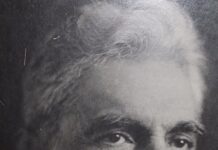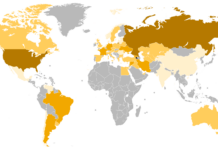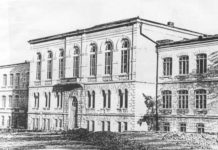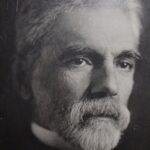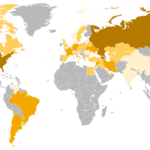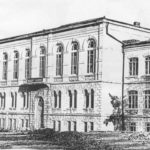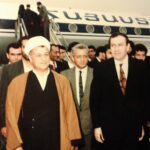The operations by the Armenians [Armenian Secret Army for the Liberation of Armenia, ASALA, and Justice Commandoes of the Armenian Genocide, JCAG.] forced the Turkish government to enter into dialogue with the leaders of the Diasporan Armenian political parties.
During a visit to the United States, Turkish Foreign Minister İhsan Sabri Çağlayangil expressed to Oshagan Choloyan, an Armenian priest of the Cilician See, his desire to meet with Diasporan Armenian leaders. Father Oshagan, in turn, conveyed the minister’s wish to Hratch Abrahamian of the ARF Bureau. Based on that unprecedented desire, a consultative inter-party meeting was convened in Beirut in order to adopt a joint position regarding the Turkish proposal. Those consultative meetings took place in the Tekeyan Centre, with the participation of Avedis Demirjian representing the Social Democratic Hunchakian party, Hratch Abrahamian and Shavarsh Toriguian representing the ARF, and Parounag Tovmassian and Haig Naccashian representing the Ramgavar Armenian Democratic Liberal Party. “At that time, I was the one who kept the minutes of the meetings,” Naccashian wrote decades later.
Following two days of deliberations, it was decided to accept Turkey’s offer to have a meeting after specifically establishing the limits of the authority of the representatives during the upcoming negotiations, in everyone’ s presence. The members of the inter-party delegation were Tovmassian, Demirjian, and Toriguian.As the oldest member, Tovmassian would head the delegation.
Not much is clear about this meeting, which has been kept secret for years. Most of the participants are now deceased. Only in recent years has the Zurich meeting been touched upon in the Diasporan media and certain books.
Almost two decades after that meeting, one of the participants, Avedis Demirjian wrote, “Everyone was in high spirits. For the first time, the Turkish state was beginning to talk to the representatives of the nation against which it carried out a genocide.”
Naccashian, the Ramgavar Armenian Democratic Liberal Party member who participated in the inter-party meeting in Beirut, insists that the Zurich meeting between Çağlayangil and Diasporan Armenian party representatives “was the direct result of the vendetta which had begun with the murder of the two Turkish diplomats by Gurgen Yanikian in 1973 and which claimed the lives of some fifty Turkish diplomats and caused injury to an even greater number in the four corners of the world.” Naccashian adds, “Indeed, Yanikian’s act of revenge became the signal for active Armenian youth to carry on the task begun by this elderly Armenian, individually and spontaneously at first, then in an organised manner under the name of ASALA. … I am presenting the items on the agenda and the course of the Zurich meeting as Tovmassian told me with all their details. I recorded this in order to present a report at the ADL [Ramgavar] Central Committee meeting, which was to be held a few days later.”
Two Turkish representatives sat face to face with Armenians in the Green Room of the Dolder Grand Hotel in Zurich. Then, according to prior agreement, Parounag Tovmassian, as the oldest present, began by thanking and expressing appreciation towards the Turkish foreign minister’s initiative. He expressed hope that, even if there were no results at that gathering –the first of its kind in the past fifty years– it could create opportunities for new contacts between the two nations which “have lived lovingly with each other for centuries.”
Showing a disposition toward being “helpful” to the Armenian people, the Turkish foreign minister also jokingly mentioned a rumour attributing Armenian origins to his family and offered as proof his surname, Çağlayan Gil (possibly rendered into Armenian as “Çağlayanenk”), which was presently being used in Turkified form. Lending an emotional tone to his “Armenophile” stance, he added that, owing to his advanced age, it was possible that he would not be serving in future Turkish governments, so he advised that the Armenians should take advantage of his presence.
Çağlayangil said, “We have a terrible past behind us. Incidents occurred on both sides which brought no honour to our two peoples. …We became tools in the hands of the great powers who used us in their own interests. Even now I think the same is continuing in your case and that of the Kurds. You must know that we are the state successors ofthe Ottoman Empire, but not the policies it conducted.”
It became clear from the words of the number one Turkish diplomat that the main motive that forced him to meet with the three traditional Diasporan parties was the armed anti-Turk operations carried out by Armenians. “They put me in quite a difficult situation, asking how much longer the Turkish ambassadors are going to be shot like birds. My response to those who say such things is the following: we are a state and cannot behave like them. It’s true our capabilities are greater. As a state, we can hire hundreds of murderers and respond in the same manner. However, we must look for a possibility to turn away from the present situation and find a modus vivendi,” saidÇağlayangil, while accusing the Armenian political parties of “inciting young Armenians to fight against Turks.”
In connection with the demand to put an end to the campaign to assassinate Turkish diplomats, the Armenian delegates said that, although they “understood the anger that provoked the Armenian youth who had joined that campaigns, they themselves did not agree with the method of resolving matters through bloodshed”. At the same time, however, “They could not condemn and, especially, prevent those youths, considering that the latter had no ties whatsoever with the political parties”. On the contrary, “They were detached elements who were dissatisfied with the peaceful and lawful advocacy of the political parties. By finding partisans in the four corners of the world, they had formed their independent organisations and forged their own modus operandi and plans.”
Shavarsh Toriguian responded that, “Our two peoples are obliged by fate to live side by side,” but the Turks deported, massacred, and annihilated the Armenian people, destroyed Armenian cultural monuments, and confiscated Armenian wealth. “Mr. Minister, you have to accept that an immense injustice has been done against the Armenian nation. Our aim is that the injustice which has occurred be compensated,” Toriguian emphasised. Avedis Demirjian continued that they represent the political parties, take part in party activities, have no enmity with the Turkish people, and are against terrorism on principle. “We have lived side by side with the Turkish people. The Armenian nation was one of the elements which constructed the Ottoman Empire, yet today it is scattered around the world.The land of our forefathers has been stolen from us,” the Hunchakian Party representativesaid.
Çağlayangil answered that the remedy must be found in order to re-establish “friendly relations” between the Armenians and Turks. “It is necessary to do something in order to calm your youth. What do you suggest?” the Turkish foreign minister asked.
Toriguian said, “We are waiting for positive steps from the Turkish authorities. First of all the fault must be acknowledged. It must be condemned, the rights of the Armenian nation must be accepted and fulfilled. Our nation, which survived genocide, has been able to recover and become a claimant. Mr. Minister, you pose the question of what must be done. Why do you not follow the example of what Germany has done? They acted wisely. They condemned what occurred and compensated the Jewish nation.”
Çağlayangil replied that there are positive and negative points of view in those proposals. “It is positive for example that errors must be corrected. But how? Your issue was with the Ottoman government, not the Turkish people. I accept that present-day Turkey must do something to alleviate the pain. I cannot negotiate with you on the territorial issue. You were not a state in the Ottoman Empire. You were a community along with other communities. There are no grounds for your territorial demands. I am not justifying the methods of the Ottoman government against the peaceful nation, but it is not right to say that everything was done by the Turks. The state could have caught your revolutionaries and hanged them, not massacred the innocent. Dwelling on the past will not resolve our situation. We must think about that, but we must also accept that territorial claims and killing diplomats here and there are not acceptable measures. We also have youth who can resort to the same methods. We are a state; we have the means to retaliate.”
Toriguian objected, saying that Turkey must change its position. “It is not possible to close the issue by not talking about it or by saying that both sides are guilty. The main thing is the resolution of the Armenian issue, the rights of the Armenian nation to live and thrive on its ancestral lands.” Demirjian added that the improvement in relations between Armenians and Turks depended on positive consequences in dealing with the Armenian issue. The Turkish foreign minister assured them that he was ready to prepare the grounds for negotiations between the Turkish government and the three Armenian political parties, if that were put within the framework of acceptable demands. “Material compensation, resettlement, and offering certain privileges for Armenians are acceptable issues, but your territorial demandsare absolutely not acceptable. That demand is not acceptable to any Turk whatsoever, not even a traitor.”
At the end of the one-day meeting, telephone numbers were exchanged with hopes of meeting again.
Two months after this meeting, changes took place in the government and Çağlayangil was not included in the new government.
The Armenian movement for revenge that thus prompted Turkey to engage in dialogue weakened over the ensuing years and eventually ceased as a consequence of the plots hatched and pressure exerted by the pro-Turkish international intelligence agencies which resulted in the deaths of several “organisers and freedom fighters of the armed struggle.”
There is a brief reference to the Zurich meeting in one of the Ramgavar party’s documents. It does not add anything new to the above. The only new thing is that, according to the document, “The national state officials [i.e., the Soviet Armenian authorities] have been kept informed about the meeting.”
Tatul Hakobayn
Note- This chapter is from Tatul Hakobyan’s book- ARMENIANS and TURKS

